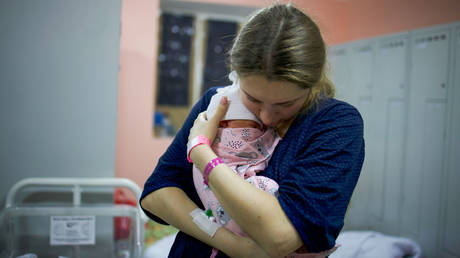ARTICLE AD BOX
The country’s population is increasingly sustained by immigrants and the elderly, government statistics show
Births in France fell to their lowest number last year since the end of the Second World War, the country’s national statistics office has revealed. As in much of Europe, fertility rates in France are declining, while mass immigration keeps population numbers up.
Around 678,000 babies were born in France in 2023, the National Institute of Statistics and Economic Studies (Insee) announced in a report on Tuesday. This figure represents a 6% decline from 2022 and the lowest number for any year since 1946, when much of the country lay in ruins and more than half a million people had been killed in the war.
After a baby boom beginning at the turn of the millennium, births in France have fallen every year since 2010. The country’s fertility rate – or the average number of children for each woman – has fallen from 1.99 in 2013 to 1.68 last year.
Despite more than a decade of declining births, France’s population has continued to grow, rising by 0.3% last year to 68.4 million. Insee cited declining deaths, rising life expectancy, and the influx of 183,000 immigrants by the end of the year.
Read more Ukraine to have world’s lowest fertility rate – WSJ
Ukraine to have world’s lowest fertility rate – WSJ
Birth rates have declined across the entire EU since 2008, according to data from the bloc’s statistics office, Eurostat. Despite its own demographic woes, France had the highest fertility rate in the union as of 2021, followed by the Czech Republic, Romania, and Ireland.
With native Europeans living longer lives and having fewer children, the EU has been open about its desire to massively increase immigration to the bloc. Speaking in Athens earlier this month, European Commissioner for Home Affairs Ylva Johansson stated that “legal migration should grow by more or less 1 million per year.”
With around 3.5 million immigrants entering the EU legally every year and record numbers entering illegally, Johannsson’s proposition is an unpopular one. Increased immigration has bolstered support for right wing political parties in Germany and the Netherlands, triggered riots and arson in Ireland, and prompted the French government to pass a bill introducing migration quotas and cutting benefits for foreigners, in a bid to stem the rising popularity of its right-wing opposition.
A Kantar poll taken in France in December found that 45% of the population believes that “there are too many immigrants” in the country.
.png)
 1 year ago
5
1 year ago
5








 English (US)
English (US)